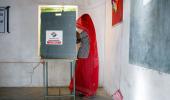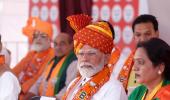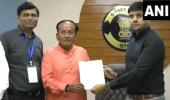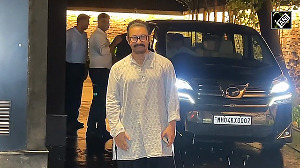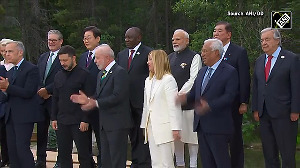'Rather than criticising the kind of candidates fielded by political parties from our living rooms, NOTA in a sense implores the electorate to say this by turning up in person at a polling booth to ensure their protest is registered.'

Not just the Congress and other Opposition parties, but also activists, have questioned, and some of them intend to challenge the Election Commission's decision to announce the Bharatiya Janata Party's Mukesh Dalal elected unopposed from the Surat parliamentary constituency last month.
They have argued that by not holding polling in Surat when all other candidates either withdrew or had their nominations rejected, leaving only Dalal in the contest, the Election Commission took away the electors' right to vote for 'none of the above', or NOTA.
Trilochan Sastry, founding member of the Association for Democratic Reforms (ADR), says polling should have taken place in Surat, or in any constituency, even if only one candidate is left in the fray, to permit the electors the right to exercise the NOTA option on the electronic voting machines (EVMs).
"For that to happen, a voter whose right to vote has been taken away by the Election Commission's decision in Surat, or in similar instances, would need to file a writ petition in the relevant high court to seek to direct the Election Commission to hold polling," Sastry told Business Standard.
The Election Commission also announced 10 candidates of the BJP elected unopposed in the Arunachal Pradesh Assembly polls since no other candidate was in the contest.

Fact or fiction?
Addressing a press conference in Ahmedabad on April 28, Congress Rajya Sabha member Abhishek Manu Singhvi said the returning officer, in announcing Dalal elected unopposed, forgot about NOTA.
According to Singhvi, the returning officer showed the Election Commission's handbook where, when all candidates barring one withdraw from the contest, the contestant that is left is declared elected.
"But that handbook was made before NOTA was born. NOTA is a candidate. As long as NOTA is alive and kicking on the paper, you cannot," Singhvi said.
However, according to Akshay Rout, a former director general at the Election Commission, the current status is that NOTA is yet to get the status of a 'candidate'.
"There are no consequences to NOTA beyond the fact that it is indeed a protest vote in the sense that a voter turns up at a polling booth to reject all the candidates contesting the polls from that seat," Rout says.
According to him, the NOTA option is indeed an answer to voter apathy, especially among urban voters.
"Rather than criticising the kind of candidates fielded by political parties from our living rooms, NOTA in a sense implores the electorate to say this by turning up in person at a polling booth to ensure their protest is registered," Rout explains.
"But only time will tell whether the demands for and discussions over pros and cons for giving a higher functionality to NOTA lead to a decision," Rout says.
In its analysis of NOTA votes polled from 2018 to 2022, the ADR recommended that in any constituency, if votes polled for NOTA are higher than all the contesting candidates, then "no candidates should be declared as elected" and "fresh election should be conducted in which none of the earlier candidates should be allowed to contest".
"In the fresh elections," it said, "only a candidate who gets at least 50 per cent plus one votes cast should be declared elected."
On April 26, the Supreme Court agreed to examine a petition by author and motivational speaker Shiv Khera that the Election Commission should treat NOTA as a 'fictional candidate', publicise its candidacy, and if NOTA gets the highest votes in a constituency then bar all the other contestants on the seat from fighting elections for the next five years.
The bench of Chief Justice of India Dr D Y Chandrachud and Justices J B Pardiwala and Manoj Mishra agreed to examine the petition when pointed out that the BJP's Surat candidate was elected unopposed when others withdrew, and that people's mandate would have been known had the BJP's candidate contested with NOTA as a 'fictional candidate'.
Khera's petition also pointed out that Maharashtra and Haryana state election commissions treat NOTA as a 'fictional' candidate for civil elections.
Toothless tiger?
According to the Election Commission's Atlas of the 2019 Lok Sabha polls, in its judgement on September 27, 2013, on a petition by the Peoples Union for Civil Liberties, the Supreme Court directed that there should be a 'None of the Above', or NOTA, option on the ballot papers and EVMs.
The provision for NOTA was made during the assembly elections to Delhi, Chhattisgarh, Madhya Pradesh, Mizoram, and Rajasthan in November-December 2013. It has continued after that in all assembly and Lok Sabha polls.
In the 2019 Lok Sabha polls, according to Election Commission data, the vote share of NOTA was 1.06 per cent, down from 1.08 per cent in the 2014 LS polls (see graphic for more).
While allowing for the provision in 2013, the Supreme Court observed that a high number of NOTA votes would compel political parties to field candidates with high moral and ethical standards.
It observed that for democracy to survive, it was essential that the best available persons be chosen as people's representatives.
It said that for this to happen, voters should be given the choice to opt for NOTA to compel political parties to nominate a sound candidate, and recognised the 'dire need of negative voting'.
Before the introduction of EVMs, the more knowledgeable sought the option of filling form 49O under Rule 49-O of the Conduct of Election Rules, 1961, but it required asking for it from the polling staff, which compromised secrecy.
Others registered their protest by either stamping the ballot paper on more than one box to make it invalid, or dropping a blank ballot paper into the box or even inscribing the ballot papers with such lines of cynicism as, 'Sab chor hain' (they are all thieves). The votes were counted, but declared invalid.
The EVMs took away this option as the beep that emitted at the pressing of a button on the machine conveyed that a vote had been cast. Not casting a vote was no longer an option.
The Supreme Court also acknowledged France, Belgium, Brazil, Chile, and Bangladesh used the NOTA option, and recognised that it could increase voter participation, since it would persuade voters to come out and vote rather than not turning up.
However, NOTA is not akin to the 'right to reject', as the Supreme Court also felt it could be misused and manipulated, and recognised the administrative costs involved in organising repolls.
But neither has NOTA, as the apex court had hoped, ensured that political parties field candidates who are not tainted or have no criminal records.
Interestingly, as the electoral data from the 2014 and 2019 Lok Sabha polls shows, the incidence of electors exercising NOTA is higher in seats reserved for scheduled castes and scheduled tribes, especially in states such as Bihar and Chhattisgarh, which suggests that the level of disillusionment could be higher.
In the run up to the December 2023 assembly polls in Chhattisgarh, Bhupesh Baghel, then chief minister of the state, demanded that the Election Commission should scrap the NOTA option since on occasion it accrued more votes than the margin of win or loss of the top two contenders on a seat.
Feature Presentation: Ashish Narsale/Rediff.com


